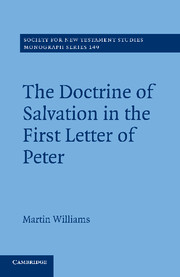Introduction
Published online by Cambridge University Press: 05 November 2011
Summary
Salvation in 1 Peter
David Ford in his book Theology: A Very Short Introduction, observes that ‘[b]ecause of its many dimensions, salvation is a topic where most key theological issues can be seen to converge’. As Ford demonstrates, a number of key issues come into focus when we address the theme of salvation: the way we think about God, creation and providence, evil and sin, the person and work of Jesus Christ, the church and sacraments, the Christian life and ethics, and the future consummation of all things. Soteriology is thus inseparably related to theology (the doctrine of God), anthropology (the doctrine of humanity and sin), Christology (the doctrine of the person and work of Christ), ecclesiology (the doctrine of the church and sacraments), and eschatology (the doctrine of last things). Joel Green suggests that ‘[i]f we take seriously that “theme” expresses “a relation of being about,” that the “theme” of a text has to do with unifying the many and often distinct and sometimes discontinuous elements of a text, then there is an important sense in which we are justified in speaking of salvation as the theme of Scripture. Here is the integrating center of Scripture, just as it is the coordinating center of theology.’
However, in 1995 I. H. Marshall wrote, ‘[a]lthough this subject [salvation] is of central importance to the Bible and is treated in standard theological dictionaries and encyclopedias, it has had remarkably little attention directed to it in theological monographs’. The present situation has improved only a little since then. The same, however, cannot be said with regard to 1 Peter. Commentators have long recognised the theological richness of 1 Peter in general and the importance and richness of its soteriological language in particular. However, as van Rensburg has recently observed, ‘[t]he soteriology of 1 Peter has, to a large extent, been neglected. No monograph on soteriology in 1 Peter could be located – only scattered and sporadic remarks in commentaries and in articles’. This neglect is evidenced by a recent survey by M. Dubis, ‘Research on 1 Peter: A Survey of Scholarly Literature Since 1985’ in Currents of Biblical Research (2006), in which he lists only two recent (1987, 2002) scholarly treatments of 1 Peter’s soteriology (neither of which are very substantial): one article treats redemption in 1 Peter (two and a half pages) while the other addresses the issue of whether a predestination to judgment appears in 2:8 (four and a quarter pages). Scholarly literature treating the topic of salvation generally consists of either a few pages set aside in the introductions of some commentaries on 1 Peter or treatments of the theme of salvation in 1 Peter as part of broader surveys. The theme of salvation does not fare much better in doctoral dissertations. A number of dissertations on 1 Peter have appeared in recent years treating such themes as the doctrine of God, Christology, baptism, hope, suffering, obedience, the Christian life, ethics, even the atonement, the new birth, and election, however there has been no similar study carried out on the theme of salvation. The importance of such a study becomes immediately apparent, for, as we noted above, the theme of salvation is inseparably related to our understanding of God and the person and work of Christ, and is foundational for our understanding of the Christian life, baptism, obedience, ethics, suffering, and hope.
- Type
- Chapter
- Information
- Publisher: Cambridge University PressPrint publication year: 2011



